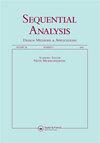Design and performance evaluation in Kiefer-Weiss problems when sampling from discrete exponential families
IF 0.6
4区 数学
Q4 STATISTICS & PROBABILITY
Sequential Analysis-Design Methods and Applications
Pub Date : 2022-03-26
DOI:10.1080/07474946.2022.2109673
引用次数: 4
Abstract
Abstract In this article, we deal with problems of testing hypotheses in the framework of sequential statistical analysis. The main concern is the optimal design and performance evaluation of sampling plans in the Kiefer-Weiss problems. For the case of observations following a discrete exponential family, we provide algorithms for optimal design in the modified Kiefer-Weiss problem and obtain formulas for evaluating their performance, calculating operating characteristic function, average sample number, and some related characteristics. These formulas cover, as a particular case, sequential probability ratio tests (SPRTs) and their truncated versions, as well as optimal finite-horizon sequential tests. On the basis of the developed algorithms we propose a method of construction of optimal tests and their performance evaluation for the original Kiefer-Weiss problem. All algorithms are implemented as functions in the R programming language and can be downloaded from https://github.com/tosinabase/Kiefer-Weiss, where the code for the binomial, Poisson, and negative binomial distributions is readily available. Finally, we make numerical comparisons of the Kiefer-Weiss solution with the SPRT and the fixed-sample-size test having the same levels of the error probabilities.离散指数族抽样时Kiefer-Weiss问题的设计与性能评价
摘要在这篇文章中,我们讨论了在序列统计分析的框架下检验假设的问题。主要关注的是Kiefer-Weiss问题中采样计划的优化设计和性能评估。对于离散指数族观测的情况,我们提供了改进的Kiefer-Weiss问题的优化设计算法,并获得了评估其性能、计算操作特征函数、平均样本数和一些相关特征的公式。作为一种特殊情况,这些公式涵盖了序列概率比检验(SPRT)及其截断版本,以及最优有限时域序列检验。在所开发算法的基础上,我们提出了一种构造最优测试的方法,并对原始Kiefer-Weiss问题进行了性能评估。所有算法都以R编程语言中的函数形式实现,可以从https://github.com/tosinabase/Kiefer-Weiss,其中二项式、泊松和负二项式分布的代码很容易获得。最后,我们对Kiefer-Weiss解和SPRT以及具有相同错误概率水平的固定样本量检验进行了数值比较。
本文章由计算机程序翻译,如有差异,请以英文原文为准。
求助全文
约1分钟内获得全文
求助全文
来源期刊

Sequential Analysis-Design Methods and Applications
STATISTICS & PROBABILITY-
CiteScore
1.40
自引率
12.50%
发文量
20
期刊介绍:
The purpose of Sequential Analysis is to contribute to theoretical and applied aspects of sequential methodologies in all areas of statistical science. Published papers highlight the development of new and important sequential approaches.
Interdisciplinary articles that emphasize the methodology of practical value to applied researchers and statistical consultants are highly encouraged. Papers that cover contemporary areas of applications including animal abundance, bioequivalence, communication science, computer simulations, data mining, directional data, disease mapping, environmental sampling, genome, imaging, microarrays, networking, parallel processing, pest management, sonar detection, spatial statistics, tracking, and engineering are deemed especially important. Of particular value are expository review articles that critically synthesize broad-based statistical issues. Papers on case-studies are also considered. All papers are refereed.
 求助内容:
求助内容: 应助结果提醒方式:
应助结果提醒方式:


